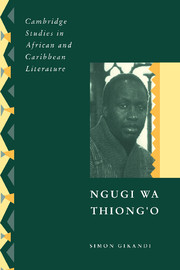Book contents
- Frontmatter
- Contents
- Preface
- Chronology
- 1 Introduction: reading texts and contexts
- 2 Narrative and nationalist desire: early short stories and The River Between
- 3 Educating colonial subjects: the “emergency stories” and Weep Not, Child
- 4 Representing decolonization: A Grain of Wheat
- 5 The poetics of cultural production: the later short stories and Petals of Blood
- 6 Performance and power: the plays
- 7 The prisonhouse of culture: Detained and Devil on the Cross
- 8 The work of art in exile: Matigari
- 9 Writing freedom: essays and criticism
- Conclusion
- Notes
- Bibliography
- Index
4 - Representing decolonization: A Grain of Wheat
Published online by Cambridge University Press: 09 February 2010
- Frontmatter
- Contents
- Preface
- Chronology
- 1 Introduction: reading texts and contexts
- 2 Narrative and nationalist desire: early short stories and The River Between
- 3 Educating colonial subjects: the “emergency stories” and Weep Not, Child
- 4 Representing decolonization: A Grain of Wheat
- 5 The poetics of cultural production: the later short stories and Petals of Blood
- 6 Performance and power: the plays
- 7 The prisonhouse of culture: Detained and Devil on the Cross
- 8 The work of art in exile: Matigari
- 9 Writing freedom: essays and criticism
- Conclusion
- Notes
- Bibliography
- Index
Summary
It is tempting to read A Grain of Wheat, the novel that cemented Ngugi's reputation as a major writer, through the prism established by Frantz Fanon in his critique of colonialism and the perils of decolonization. Indeed, it has often been claimed that Ngugi was in the process of writing this novel when he came across Fanon's The Wretched of the Earth, and that it was in this book that he simultaneously discovered the politics of socialism and a grammar for representing colonialism and what has now come to be known as arrested decolonization. It has even been said that Fanon's famous critique of decolonization as an arrested moment – one in which national consciousness has failed to be “the sill-embracing crystallization of the inner hopes f the whole people” and has instead become “an empty shell, a crude and fragile travesty of what it might have been” - provided Ngugi with an important epigraphic text for his third novel. And if epigraphs are important because they determine or shape readers' expectations as they enter the text, our entry into Ngugi's novel is guided by a powerful image of a grain that wilts and dies instead of growing into “that body that shall be,” and by an authorial note drawing attention to the reality of the situation represented in the novel, a situation in which the peasants who fought against British colonial rule in Kenya “now see all that they fought for being put on one side.” Both epigraphs are powerful echoes of Fanon's critique of decolonization.
- Type
- Chapter
- Information
- Ngugi wa Thiong'o , pp. 98 - 127Publisher: Cambridge University PressPrint publication year: 2000



